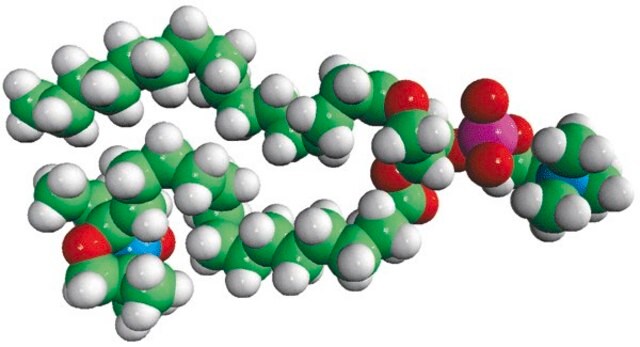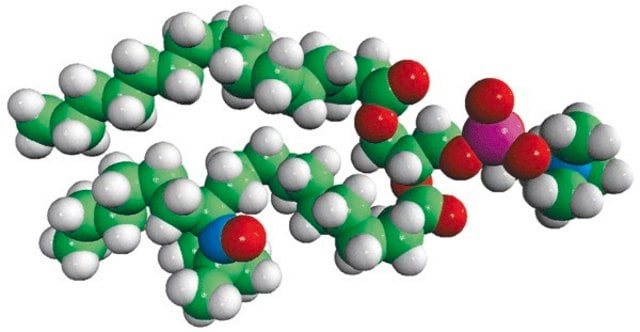810606P
Avanti
16:0 Tempo PC
Avanti Research™ - A Croda Brand 810606P, powder
Synonym(s):
1,2-dipalmitoyl-sn-glycero-3-phospho(tempo)choline
Sign Into View Organizational & Contract Pricing
All Photos(1)
About This Item
Empirical Formula (Hill Notation):
C48H94N2O9P
CAS Number:
Molecular Weight:
874.24
UNSPSC Code:
41141825
NACRES:
NA.25
Recommended Products
Assay
>99% (TLC)
form
powder
packaging
pkg of 1 × 1 mg (810606P-1mg)
manufacturer/tradename
Avanti Research™ - A Croda Brand 810606P
lipid type
phospholipids
ESR probes
shipped in
dry ice
storage temp.
−20°C
General description
1,2-dipalmitoyl-sn-glycero-3-phospho(tempo)choline (16:0 Tempo PC) is a spin label phospholipid, where TEMPO moiety is attached to phosphocholine headgroup.
Application
1,2-dipalmitoyl-sn-glycero-3-phospho(tempo)choline (16:0 Tempo PC) may be used:
- as a spin-labeled quencher in liposomes to determine fluorophore depth
- as spin-labeled phospholipid along with 1,2-dimyristoyl(d54)-sn-glycero-3-phosphocholine-1,1,2,2-d4-N,N,N-trimethyl-d9 (DMPC-d67) to label lidocaine for paramagnetic relaxation measurements
- as a spin label to investigate the dependence of the packing and polarity of 1,2-dilauroyl-sn-glycero-3-phosphocholine (DLPC) bilayers with temperature or as quenchers of the Laurdan fluorescence to study the Laurdan position in fluid bilayers
Biochem/physiol Actions
1,2-dipalmitoyl-sn-glycero-3-phospho(tempo)choline (16:0 Tempo PC/Tempo-PCSL) can effectively repress Laurdan fluorescence and can also quench the emission of long wavelength state.
Packaging
5 mL Clear Glass Sealed Ampule (810606P-1mg)
Legal Information
Avanti Research is a trademark of Avanti Polar Lipids, LLC
Storage Class Code
11 - Combustible Solids
WGK
WGK 3
Flash Point(F)
No data available
Flash Point(C)
No data available
Certificates of Analysis (COA)
Search for Certificates of Analysis (COA) by entering the products Lot/Batch Number. Lot and Batch Numbers can be found on a product’s label following the words ‘Lot’ or ‘Batch’.
Already Own This Product?
Find documentation for the products that you have recently purchased in the Document Library.
Alexander Kyrychenko et al.
The Journal of membrane biology, 253(1), 73-77 (2019-09-22)
The characterization of the behavior of lipid-attached spin probes in a bilayer is of fundamental importance for correct interpretation of the results of both EPR and fluorescence studies of protein-membrane interactions. The knowledge of the immersion depth of TEMPO spin
Cíntia C De Vequi-Suplicy et al.
Journal of fluorescence, 16(3), 431-439 (2006-06-23)
Laurdan (2-dimethylamino-6-lauroylnaphthalene) is a hydrophobic fluorescent probe widely used in lipid systems. This probe was shown to be highly sensitive to lipid phases, and this sensitivity related to the probe microenvironment polarity and viscosity. In the present study, Laurdan was
Victor Vasquez-Montes et al.
Biochimica et biophysica acta. Proteins and proteomics, 1867(7-8), 691-700 (2019-04-21)
Bcl-xL is a member of the Bcl-2 family of apoptotic regulators, responsible for inhibiting the permeabilization of the mitochondrial outer membrane, and a promising anti-cancer target. Bcl-xL exists in the following conformations, each believed to play a role in the
Diego E Sastre et al.
The Journal of biological chemistry, 295(7), 2136-2147 (2019-12-05)
PlsX plays a central role in the coordination of fatty acid and phospholipid biosynthesis in Gram-positive bacteria. PlsX is a peripheral membrane acyltransferase that catalyzes the conversion of acyl-ACP to acyl-phosphate, which is in turn utilized by the polytopic membrane
Nicole Weizenmann et al.
Biochimica et biophysica acta, 1818(12), 3010-3018 (2012-07-31)
The membrane location of the local anesthetics (LA) lidocaine, dibucaine, tetracaine, and procaine hydrochloride as well as their influence on phospholipid bilayers were studied by ³¹P and ¹H magic-angle spinning (MAS) NMR spectroscopy. The ³¹P NMR spectra of the LA/lipid
Our team of scientists has experience in all areas of research including Life Science, Material Science, Chemical Synthesis, Chromatography, Analytical and many others.
Contact Technical Service







